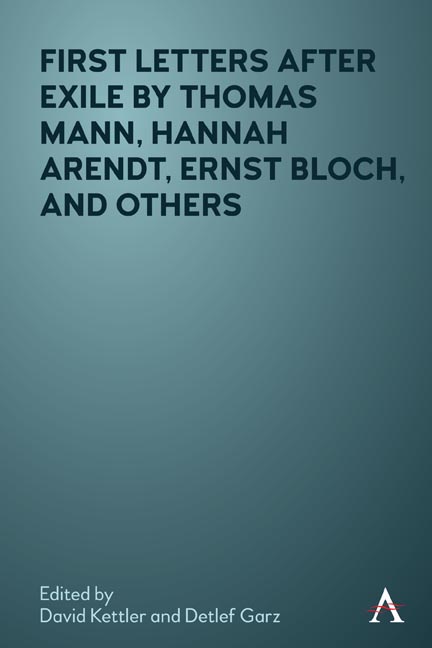Book contents
- Frontmatter
- Contents
- Preface
- Chapter 1 The “First Letters” Exile Project: Introduction
- Chapter 2 “That I Will Return, My Friend, You Do Not Believe Yourself ”: Karl Wolfskehl – Exul Poeta
- Chapter 3 “I Do Not Lift a Stone”: Thomas Mann’s “First Letter” to Walter von Molo
- Chapter 4 Faust Narrative and Impossibility Thesis: Thomas Mann’s Answer to Walter von Molo
- Chapter 5 “That I Am Not Allowed for a Moment to Forget the Ocean of Blood”: Hans-Georg Gadamer and Leo Strauss in Their First Letters after 1946
- Chapter 6 Return into Exile: First Letters to and from Ernst Bloch
- Chapter 7 A Postwar Encounter without Pathos: Otto Kirchheimer’s Critical Response to the New Germany
- Chapter 8 An Exile’s Letter to Old Comrades in Cologne: Wilhelm Sollmann’s Critique of German Social Democracy and Conception of a New Party in Postwar Germany
- Chapter 9 First Letters: Arendt to Heidegger
- Chapter 10 Denazification and Postwar German Philosophy: The Marcuse/Heidegger Correspondence
- Chapter 11 “It Would Be Perhaps a New Exile and Perhaps the Most Painful”: The Theme of Return in Oskar Maria Graf ’s Letters to Hugo Hartung
- Chapter 12 Social Constellation of the Exile at the End of the Second World War and the Pragmatics of the “First Letters”: An Objective Hermeneutic Structural and Sequence Analysis
- Notes on Contributors
- Index
Chapter 1 - The “First Letters” Exile Project: Introduction
Published online by Cambridge University Press: 25 February 2022
- Frontmatter
- Contents
- Preface
- Chapter 1 The “First Letters” Exile Project: Introduction
- Chapter 2 “That I Will Return, My Friend, You Do Not Believe Yourself ”: Karl Wolfskehl – Exul Poeta
- Chapter 3 “I Do Not Lift a Stone”: Thomas Mann’s “First Letter” to Walter von Molo
- Chapter 4 Faust Narrative and Impossibility Thesis: Thomas Mann’s Answer to Walter von Molo
- Chapter 5 “That I Am Not Allowed for a Moment to Forget the Ocean of Blood”: Hans-Georg Gadamer and Leo Strauss in Their First Letters after 1946
- Chapter 6 Return into Exile: First Letters to and from Ernst Bloch
- Chapter 7 A Postwar Encounter without Pathos: Otto Kirchheimer’s Critical Response to the New Germany
- Chapter 8 An Exile’s Letter to Old Comrades in Cologne: Wilhelm Sollmann’s Critique of German Social Democracy and Conception of a New Party in Postwar Germany
- Chapter 9 First Letters: Arendt to Heidegger
- Chapter 10 Denazification and Postwar German Philosophy: The Marcuse/Heidegger Correspondence
- Chapter 11 “It Would Be Perhaps a New Exile and Perhaps the Most Painful”: The Theme of Return in Oskar Maria Graf ’s Letters to Hugo Hartung
- Chapter 12 Social Constellation of the Exile at the End of the Second World War and the Pragmatics of the “First Letters”: An Objective Hermeneutic Structural and Sequence Analysis
- Notes on Contributors
- Index
Summary
On October 13, 1947, the prominent Weimar cultural critic and Nazi-era exile living in New York, Siegfried Kracauer, composed the following letter to Wolfgang Weyrauch in Germany, whom he had evidently known years earlier, when Weyrauch was a student in Frankfurt and an occasional contributor to Kracauer's Frankfurter Zeitung:
I have received your letters—including the last one—as well as the books. I am surprised that you now insist on a quick reply, after you never thought to keep up your connections with me throughout the Hitler years and even the years before. Since you overlook this circumstance, I am compelled to mention it. In the meantime things have happened that you know about—things that make it impossible for me simply to resume connections with people over there without being altogether certain of them. Such things are not forgettable. And if it is at all possible to restore trust, it is a far more difficult task than you seem to assume. You also seem to harbor illusions about our life: it has been and it is hard and difficult.
Six days later, he rewrote the as-yet-unmailed letter. In the revision, Kracauer replaces the colloquial suggestion that contact might resume after a while with a more personal and concrete—but also less companionable—choice of language, telescoping two of his earlier thoughts, by turning directly to the “things” whose occurrence make it “infinitely difficult to regain trust in people from over there from whom I have not heard in such a long time.” Finally, replacing his statement about the hardships of exile, he simply concluded with: “I do not want to say anything more. There is too much in the way.”
Kracauer's letter to Weyrauch is an example of the genre I call “First Letters” and which I propose to examine for their witness about the dynamics and dilemmas of exile and return. Minimally characterized, they are letters written as soon as possible after the war by refugees from Nazi Germany to someone known to them earlier who had remained in Germany during the Hitler years, including letters in reply to initiatives from German correspondents.
- Type
- Chapter
- Information
- Publisher: Anthem PressPrint publication year: 2021



